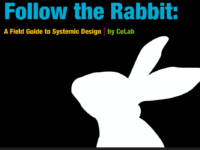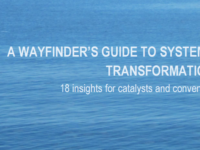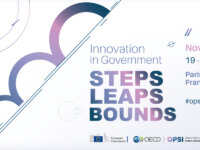A blog series introducing and sharing guidance for using different tools to support systems thinking and practice, including actor mapping, trend mapping, timeline mapping, ecocycle mapping, appreciative inquiry, and world cafe. Each offers a downloadable guide in exchange for an email address.
Global: Systems Approaches
This Field Guide is a systems take on typical design thinking methodology. It demonstrates how to design something with a greater emphasis on creativity and humour. The Guide goes through a systemic design project from concept to implementation. It takes you through the workshop planning process, and discusses workshop roles and client relations. In the FAQs, you’ll find explanations to some commonly asked questions about systemic design concepts to help you introduce others to SD and bring…
This is a report from the Workshop ‘How might we approach transformational change for complex challenges in the future?’, held in London 30-31 August 2017. It provides 18 insights and considerations for playing the enabler, catalyst, and convenor roles in creating a mindset of long-termism.
Governments around the world are experimenting with various ways to make future-oriented and value-driven decisions and it is most visible on the city level. Cities are one of the most dynamic and important administrative units today. They have a significant role to play in most of the complex challenges the world is facing from democratic crisis to climate change, aging, migration, digital transformation and peer-to-peer production.
OPSI held its conference 'Innovation in Government: Steps, leaps and bounds' on the 19 and 20 of November 2018, convening leaders and innovators from around the world in Paris.
Today, the OECD Observatory of Public Sector Innovation (OPSI) is pleased to announce the release of The Innovation System of the Public Service of Canada, the first of the OECD’s reviews of a national public sector innovation system. The report was launched at a panel discussion at OPSI’s conference “Innovation in Government: Steps, Leaps and Bounds” with speakers including: Marco Daglio, Head of the Observatory of Public Sector Innovation, OECD Rodney Ghali, Assistant Secretary of...
The annual trends report by the OECD-OPSI and the UAE’s Mohammed Bin Rashid Centre for Government Innovation (MBRCGI) identified three key trends in public innovation: identify, systems approaches and enablers and inclusiveness to vulnerable populations.
We are living in an age where access to government and politicians is ever increasing, educational levels are rising, and yet we trust government institutions less and less. On 11 October 2017, OPSI ran a workshop exploring “Trust in Government in a Digital Age” as part of the OECD Global Parliamentary Network meeting. The workshop had three goals: first, to introduce parliamentarians to new methods of working on complex problems; second, to put these methods...
In September, OPSI launched the report “System Approaches to Public Challenges: Working with Change” on dealing with complexity in public policy. To take this work forward, we launched a series of workshops with leading countries to discuss how systems approaches could change the everyday functioning of government. We held the first one on September 6, 2017 in Brdo pri Kranju in cooperation with the Prime Minister’s Office of the Government of Slovenia. This work was...
The Tool for Systemic Change assists communities and government to address wicked problems by diagnosing the different types of wicked problems that affects the communities, accompanied by an scorecard that highlights the gaps in the current efforts and proposes strategies to address the problems.









